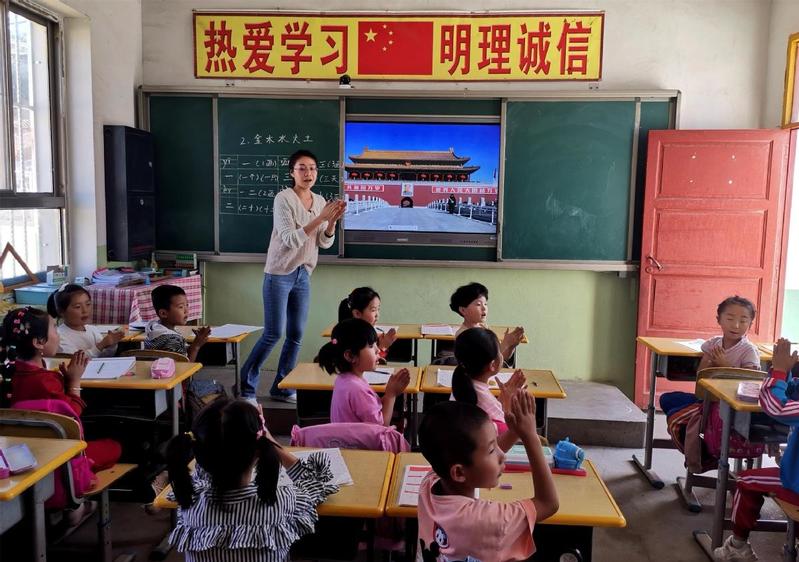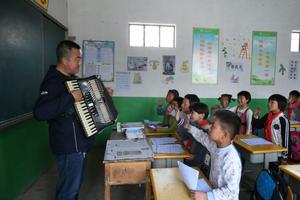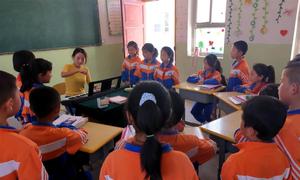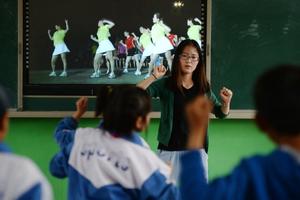Bus journeys, free housing plan working well
 Wang Wanjun gives a Chinese lesson at Shanwang Primary School in Longcheng, Gansu province. (PHOTO PROVIDED TO CHINA DAILY)
Wang Wanjun gives a Chinese lesson at Shanwang Primary School in Longcheng, Gansu province. (PHOTO PROVIDED TO CHINA DAILY)
At 7 am, 68 teachers board four white buses in Longcheng, a town in Gansu province, for a drive through the mountains to 12 village schools.
After classes, they take the vehicles for the return journey to the town in Qin'an county, where they arrive at about 5:30 pm.
Just seven years ago, Hong Xiaojuan, one of the teachers, was sleeping on a bed made from planks in a cramped, mice-infested dormitory at a school in the village of Zhangwan.
"It's hard to imagine how I got through those tough times," she said.
Now married, the math teacher, 31, and her husband moved in 2016 into a free two-bedroom apartment provided by the local government at an educational park in the town.
Wang Xusheng, president of the park, said, "Dirt-walled faculty housing in rural areas that lets in the rain and the wind scared a number of teachers away in the past.
"Imagine just how frightened a young female teacher would have been living alone on an isolated rural campus at night after school. The free residences in the town have seen the emergence of many qualified teachers for rural pupils."
Before the educational park was built, Hong used to ask one or two students to accompany her to her rural residence at night.
Many schools in rural areas only have basic classes such as Chinese and mathematics, and in some cases English. But the new plan has resulted in 12 music, physical education and art teachers arriving at the village schools twice a week, on Tuesdays and Thursdays.
 Wang Fengfeng plays basketball with pupils at Nanqi Primary School. (CHEN BIN / XINHUA)
Wang Fengfeng plays basketball with pupils at Nanqi Primary School. (CHEN BIN / XINHUA)
Zhang Wubin, a PE teacher who travels by bus and teaches at four village schools, has been impressed by a major change in one of his students. When PE lessons began at the school, the boy, who was always quiet and performed poorly in lessons, showed he had a talent for athletics.
The pupil's confidence has grown and he has led the school team in a kung fu demonstration watched by hundreds of villagers.
Zhang said, "The lack of PE classes may have deprived some rural kids of the opportunity to show their athletic prowess."
He added that village pupils now embrace outdoor activities enthusiastically, but before he arrived to take the classes, the sports grounds and equipment lay idle, covered in dust.
Wang Fengfeng, a music teacher, has been warmly welcomed by his village pupils.
"Unlike their urban peers, rural children have found that the school courses are their only chance to get a feeling for the arts. Art and music relieve them of stress and boredom after they have studied for a long time."
Wang Liwei, a former researcher at the 21st Century Education Research Institute, said poor personal hygiene, along with the failure of parents to sufficiently supervise the television programs their children watch and the electronic products they use, is "depriving rural children of good health".
"It is important for rural kids to take art, music and PE lessons, especially PE," she added.
 Music teacher Wang Fengfeng gives a lesson at a village school in Shangyuan, Longcheng. (CHEN BIN / XINHUA)
Music teacher Wang Fengfeng gives a lesson at a village school in Shangyuan, Longcheng. (CHEN BIN / XINHUA)
A survey of 253 schools in poorer areas of Gansu and Shaanxi provinces by the Rural Education Action Program, launched in 2012 by Stanford University in the United States, found that 24 percent of children in fourth and fifth grades in these areas have myopia. Many also have parasitic roundworms.
As more and better teachers travel to village schools by bus, the number of pupils has risen. For example, at Zhaoshan village school, 12 kilometers and a 30-minute drive from Longcheng, the number of pupils has risen to 40 this year, from just four in 2016.
Wang Yaping, a mother of two, moved from the village to the town in 2011 so that her children could go to kindergarten. Her husband was working in a big city, and there is no kindergarten in the village.
However, when her elder child reached primary school age in 2015, she decided to move back to the village, and is happy she did so.
"The teachers in the villages are as good as those in the town now, so there is no need for me to continue renting an apartment there," she said.
Wang Yaping added that more villagers are returning from the town with their children as the quality and number of rural teachers rise.
Longcheng, the most remote of the 17 towns in the county, used to lag behind in education, but still ranked sixth for student performance in middle school entrance exams this year.
Wang Xusheng, the educational park president, said the severe lack of teachers has badly affected many rural schools.
It is not unusual for a teacher to provide instruction on a number of subjects for pupils in different grades. At Shanwang village school, the largest of the 12 to which the teachers travel, five are responsible for classes for 70 students from four grades.
Nine-year free compulsory schooling from elementary to middle school started in rural areas in the west of the country in 2006 before being introduced nationwide two years later. Tuition, which used to be a headache for rural families, is no longer a problem in many cases.
 Song Juanli teaches pupils at Shanwang Primary School to sing. (PHOTO PROVIDED TO CHINA DAILY)
Song Juanli teaches pupils at Shanwang Primary School to sing. (PHOTO PROVIDED TO CHINA DAILY)
Improved facilities
Funding for education has grown, rising by 8.41 percent year-on-year in 2018, according to the Ministry of Education.
Rural school facilities in Longcheng have also been improved, with campuses renovated. Multimedia devices and internet access have been provided.
However, there is still a severe shortage of teachers in general.
In 2015, some 64 percent of the 13,000 primary and middle schools in Gansu had fewer than 100 students, with 219 schools each having only one student and one teacher at each of 1,190 schools, according to the provincial education authorities.
In Longcheng, nine rural schools are attended by no more than 30 students.
The central government stipulates that there must be one teacher for every 19 students at a primary school, but it is difficult for many rural schools to meet this requirement.
According to a study in 2016 by Liu Shanhuai, a professor at the Faculty of Education at Northeast Normal University in Changchun, Jilin province, nearly 50 percent of the rural schools nationwide had fewer than one teacher per class on average.
The study found that three out of four rural teachers had to take at least two subjects, and more than 40 percent of them taught at least four. The heavy workload undermined the quality of Chinese and math lessons, and the need for music, PE and art classes was barely addressed.
Wang Liwei, the researcher, said the small number of pupils attending rural schools may give them the edge over urban students when it comes to in-depth exchanges with teachers and to instructing students based on their ability.
 Teacher Zhao Chunlin helps students rehearse a dance for International Children's Day at Nanqi Primary School in Longcheng. (CHEN BIN / XINHUA)
Teacher Zhao Chunlin helps students rehearse a dance for International Children's Day at Nanqi Primary School in Longcheng. (CHEN BIN / XINHUA)
More than 50 percent of rural elementary schools with a small number of students nationwide were shut down from 2000 to 2010, according to the Ministry of Education.
With many children traveling long distances to attend school, this contributed to a rising dropout rate among rural pupils, according to a report by the 21st Century Education Research Institute in 2012.
That year, the central government called a halt to the closure of rural schools. It said families in the countryside were having to spend more than ever to pay for their children's travel and accommodations, Wang Liwei said. "Not all rural families could afford this," she added.
Chu Zhaohui, a researcher at the National Institute of Education Sciences, said governments should not try to reduce costs by closing rural schools. Instead, priority should be given to guaranteeing that every child has the right to an education.
Liu Xiuying, director of the Family Research Center at the China Youth and Children Research Center, said it is better for children to attend schools near their homes if good-quality education is provided.
"Two lifestyles-family life at home and group life at school-are equally important for kids, and are irreplaceable," she said.
In Longcheng, Wang Fengfeng, the music teacher, and his colleagues sometimes risk encountering landslides as they travel to their schools by bus, but he said all the effort involved has been worthwhile.
"Without the traveling teachers, many village schools may have vanished years ago," he added.
As most well-off parents in country areas send their children to towns or cities for better education, poor people with sick and disabled family members at home can barely afford to leave villages, according to the rural teachers.
With China set to eliminate extreme poverty by the end of this year, schools in impoverished rural areas are lending a helping hand in this respect, experts said.
Wang Yaping, the mother of two, said the fact that her children can attend a nearby school has saved her the expense of sending them to one in town.
Li Shuangjiang, the town's deputy education chief, said: "It is necessary to have at least one school in a village. If only old people are living in a village, it makes no sense for us to talk about rural revitalization.


